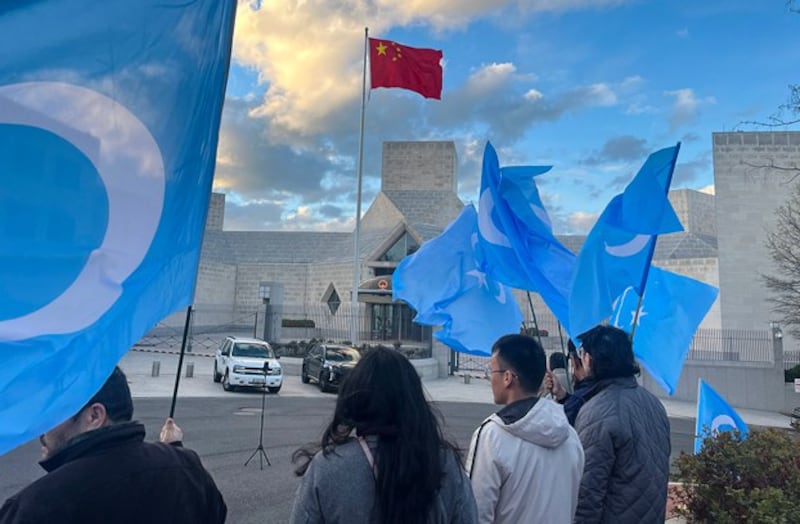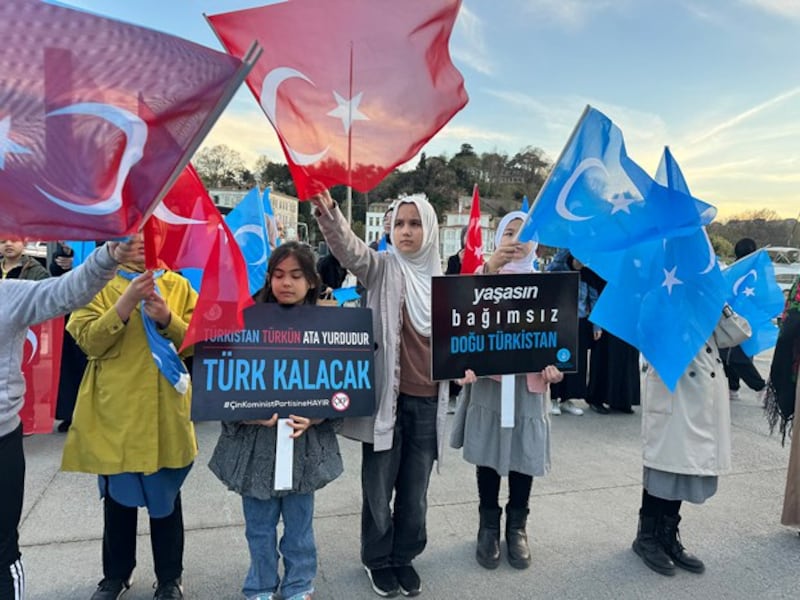Uyghurs and sympathetic protesters rallied in Washington, Istanbul and Munich on Friday to remember a 1990 uprising in Xinjiang triggered by anger over China forcing Uyghur women to get abortions and sterilizations.
The death toll from the Baren uprising – put down by Chinese troops – ranges from a couple dozen to as many as 3,000, according to the World Uyghur Congress.
Chinese authorities never held a public investigation, and Human Rights Watch said that a reliable tally of the casualties may never be known.
The rebellion started on the evening of April 4, 1990, when over 200 Uyghurs tried to break into a local government office in Baren, a town of 19,000 in Akto county on the western edge of the Taklamakan Desert in Xinjiang’s Kizilsu Kyrgyz Autonomous Prefecture.

In response, the Chinese government dispatched over 18,000 troops to quell protests, killing an unknown number of people on April 5 and subsequent days.
Seminal moment
The uprising was a seminal moment because it began a period of increased Chinese repression of the mostly Muslim Uyghurs, who today number about 11 million. Those policies have led to what the United States and other Western nations have labeled a genocide and crimes against humanity.
“The Baren Uprising was one of the earliest expressions of growing resentment within Uyghur society in the 1990s against the oppressive measures of the Chinese authorities,” said Dolkun Isa, president of the World Uyghur Congress, or WUC, in a statement.
“The Chinese government’s violent crackdown on the protestors signaled a broader escalation in the violence against the Uyghur people, which over the last decades has evolved into genocide.”
China views the April 4 incident as a "counter-revolutionary armed riot" between Uyghur militants and Chinese government forces, incited by the East Turkistan Islamic Party. People linked to the party attacked the government building, kidnapping 10 people, killing six armed police officers, and blowing up two vehicles.
Protests
Hundreds of people demonstrated in front of the Chinese Embassy in Berlin and the Chinese Consulate in Munich, Germany. Dozens of people protested outside the Chinese Consulate in Istanbul, Turkey, and at a commemorative event in Ankara attended by members of two of Turkey’s political parties.
Uyghurs held another commemorative event in Sweden. Others gathered in the Netherlands, Britain and in Central Asian nations.

In Washington, about a dozen protesters gathered outside Chinese Embassy on Friday and shouted, “China, stop the Uyghur genocide” and “We want freedom.”
The rally also featured an iftar — an evening meal eaten by Muslim families after the daylong fasts during Ramadan — with Uyghur cuisine to highlight the Chinese Communist Party's persecution of Uyghur Muslims during the Islamic holy month, which runs from March 10 to April 9 this year.
WUC Vice President Zubeyra Shamseden urged the international community to hold the perpetrators of human rights violations against the Uyghurs accountable for their crimes.
Rushan Abbas, executive director of the Campaign for Uyghurs, called the Baren Uprising a vicious example of the Chinese Communist Party's ruthless tactics attacking the legitimate demands of its people for dignity and basic human rights.”
“It started in Baren when people protested the forced sterilization and forced abortions of Uyghur women,” she told RFA. “Today, they are still continuing with this full-fledged act of genocide.”
Translated by RFA Uyghur. Edited by Roseanne Gerin and Malcolm Foster.

